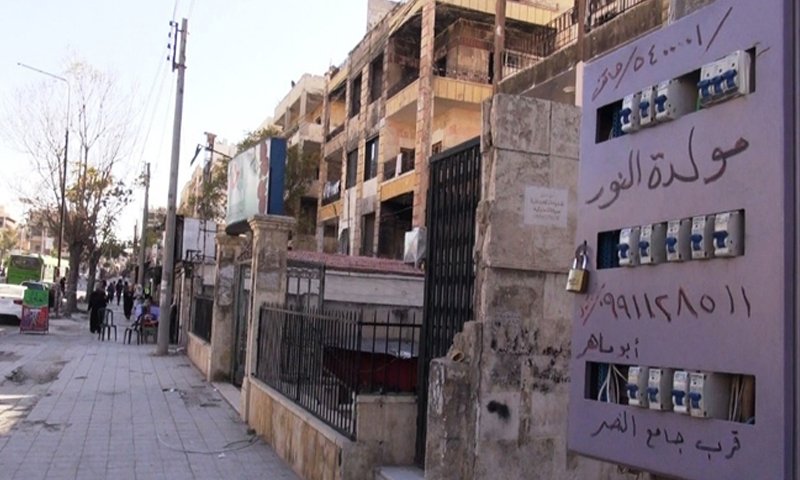“We cannot dispense with the amperes (electric generators), as electric current is improving sometimes and sometimes not,” Marwa, 49, described to Enab Baladi her inability to provide an actual alternative to paying the “ampere” subscription, which amounts to 25,000 Syrian pounds (about 5 US dollars) per week.
Marwa (pseudonym) is like many of the people of northern Aleppo governorate who are at the mercy of the owners of electric generators, as the prices of “one ampere” vary in different regions, and they increase without supervision or commitment to the prices set by the local City Council.
Residents of neighborhoods with electricity service have noticed a significant improvement in the number of hours of electricity delivered to them since mid-October, as they are now getting two hours of electricity compared to four hours of outage during the day, and four hours of power during the night, while previously the electricity was available just for two hours throughout the day.
The state-run al-Baath newspaper reported in mid-October that the electrical improvement is due to the mild climate and the noticeable decline in the use of electricity for domestic needs.
“Abundance” but with a price
The improvement of the state-distributed electricity has put the families in most areas of Aleppo in confusion between canceling the amperes subscription, which increased in parallel with the electricity abundance and straining their pockets, or maintaining the subscription based on their previous knowledge of the return of the deteriorating electricity situation after each improvement.
Marwa did not cancel the subscription to the electricity generators, but instead, she changed the type of her subscription from a full subscription to an evening subscription only, extending from five in the afternoon until one in the middle of the night, at an amount of 17,000 pounds (about 4 US dollars) to save the expenses, she told Enab Baladi.
“I will not cancel the subscription permanently for fear of a return to the deteriorating electricity situation,” she added.
The owners of electric generators began to activate the evening subscription after the improvement of the state’s electricity situation, with the return of the fifth turbine in the thermal station to work last July.
The subscription prices of amperes have increased unevenly between the western and eastern Aleppo regions, most of whose neighborhoods suffer from the lack of regular electricity access to their areas, which forces them to pay larger sums to the owners of generators, and they have no choice in dispensing with it.
Abdul-Qader, 37, told Enab Baladi, a resident of the Bustan al-Basha neighborhood, which government electricity does not reach, “the price of an amp increased this week to 20,000 pounds, while last month it was 17,000 SYP.”
Abdul-Qader expressed his suffering in securing his livelihood with the high cost of living and the high prices of amperes, which cannot be dispensed with, especially in his area that lacks state electricity.
Justifications of generator owners
The Executive Office of the Aleppo Provincial Council has set the daily operating hour price of one ampere since October 2021 with the possibility of imposing penalties against violators, which was met by the resentment and anger of generator owners on the pretext that they buy diesel at a high price, and the costs of faults that occur in generators and their maintenance are calculated from the value of the subscription.
Alaa El-Din, 45, one of the owners of generators, justified to Enab Baladi the reason for the increase in the high prices of amperes by saying that he buys diesel at an unsubsidized price from fuel sellers, and with each increase in the price of diesel, the subscription value increases.
The average price of a liter of free market diesel in the various areas under the control of the Syrian regime reached 6000 pounds, according to a report by the World Food Program (WFP) last October.
And whether the movement to cancel subscriptions was activated by the people after the improvement of the regular electricity, Alaa El-Din says that there are some cases of a subscription cancellation, but he confirmed that the subscriptions of employers and workshops continue without any cancellation, despite the fact that the cost of operating the weekly “amp” reached 33,000 pounds, compared to 28,000 last month.
Employers and workshops in the private sector rely on electricity to issue their products, and they increase working hours to cover the high cost of living as much as possible, so they cannot give up their subscriptions, no matter how high their value, but this is reflected negatively on the high price of their products.
The areas under the control of the Syrian regime suffer from a shortage of fuel, which raised the price of gasoline by nearly double last August.
The Syrian regime tried, through several laws, to resort to the private sector and invest in the electricity sector in light of its inability to provide it to the population in its areas of control.
The head of the regime, Bashar al-Assad, on 29 October, ratified a law enabling the Ministry of Electricity to license investors who wish to implement independent conventional generation projects without the obligation to purchase electricity.
“Ampere” is a well-known local name for generator electricity in Syria, which citizens rely on in light of the electricity cuts in various Syrian regions. Its price is linked to the price of diesel, as the owners of electric generators depend on it to operate the generators.

